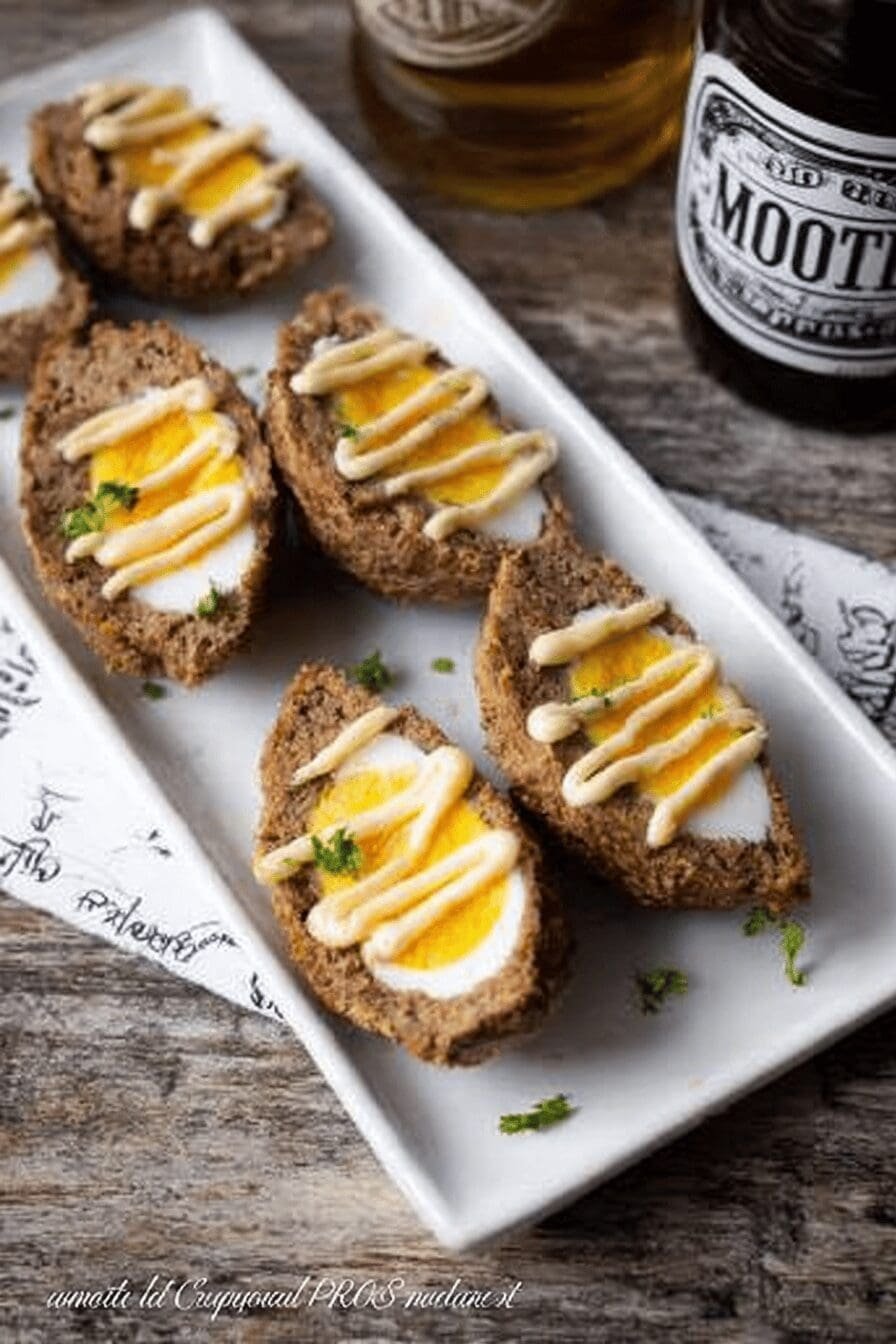Why You’ll Love This Scotch Egg
If you’re searching for a crispy Scotch egg that’s full of flavor and simple to make, this recipe hits the spot for busy home cooks and food enthusiasts alike. Picture a warm, golden snack that combines a tender boiled egg with savory sausage, all wrapped in a crunchy coating that delivers that satisfying crunch. With its easy preparation and adaptable nature, it’s perfect for quick meals or fun gatherings, making it a go-to choice for busy parents and students on the go.
This Scotch egg recipe keeps things straightforward, appealing to beginners while offering plenty of room for tweaks based on your preferences. You’ll enjoy the protein-packed boost that keeps you energized throughout the day, especially when using fresh ingredients. Whether you’re packing it for a picnic or serving it as an appetizer, this homemade treat stands out for its versatility and mouthwatering taste that keeps everyone coming back for more.
Key Benefits of a Crispy Scotch Egg Recipe
- Easy prep time under an hour, ideal for how to make Scotch eggs at home without fuss.
- A flavorful homemade Scotch egg that packs essential nutrients for balanced eating.
- Endless options to adapt for tastes, like adding herbs for extra zest.
Transitioning from everyday snacks to something special, this dish encourages you to experiment and enjoy cooking. For instance, if you’re new to flavorful homemade Scotch eggs, the simple steps make it fun and rewarding.
Jump To
- 1. Why You’ll Love This Scotch Egg
- 2. Essential Ingredients for Scotch Egg
- 3. How to Prepare the Perfect Scotch Egg: Step-by-Step Guide
- 4. Dietary Substitutions to Customize Your Scotch Egg
- 5. Mastering Scotch Egg: Advanced Tips and Variations
- 6. How to Store Scotch Egg: Best Practices
- 7. FAQs: Frequently Asked Questions About Scotch Egg
- 8. Scotch Egg
Essential Ingredients for Scotch Egg
Every great Scotch egg recipe starts with the right ingredients, and this one focuses on fresh, accessible items that create a crispy, flavorful result. Gathering these will help you build the perfect homemade Scotch egg with minimal effort. Let’s break down what you need to get started, ensuring your kitchen is prepped for success.
Gathering these ingredients means you’re set for a tasty adventure, blending simple flavors into something truly special. Remember, using quality items like fresh herbs enhances the overall experience of your crispy Scotch eggs recipe.
Full Ingredient List
- 5 large eggs (4 for boiling and 1 for breading)
- 1 small bunch of fresh chives finely chopped to about 1 tablespoon
- 3 large sprigs of fresh parsley chopped to 1 tablespoon
- 10 ounces of uncooked breakfast sausage with casings removed
- 1 tablespoon of prepared English mustard (or Dijon as a substitute)
- 1 teaspoon kosher salt
- 1/2 teaspoon black pepper
- 1/2 teaspoon freshly grated nutmeg
- 1/3 cup all-purpose flour
- 1 cup panko breadcrumbs
- 6 cups of vegetable oil for deep-frying
This structured list makes it simple to measure and prepare, ensuring your Scotch egg turns out just right every time. For more ideas on using herbs like chives and parsley, check out our pasta salad recipe that highlights fresh flavors.
How to Prepare the Perfect Scotch Egg: Step-by-Step Guide
Creating a crispy Scotch egg at home is easier than you think, with steps that guide you through a flavorful homemade treat. Start by boiling your eggs to get that perfect center, then move on to wrapping and coating for the ultimate crunch. This guide keeps things simple for home cooks, helping you avoid common pitfalls along the way.
Once you master these steps, you’ll see why this Scotch egg recipe tips make it a favorite for quick snacks. Follow along to build confidence in your cooking skills while enjoying the process.
First Steps: Preparing the Eggs and Sausage
- Boil 4 large eggs for 6-7 minutes until they reach your preferred doneness, then cool and peel them gently to keep the egg intact.
- Divide 10 ounces of uncooked breakfast sausage with casings removed into four equal portions, flattening each into a patty for easy wrapping.
- Wrap each peeled egg with a sausage patty, mixing in 1 tablespoon of prepared English mustard, 1 teaspoon kosher salt, 1/2 teaspoon black pepper, and 1/2 teaspoon freshly grated nutmeg for added flavor.
Coating and Frying
Next, set up your coating station with three bowls: one with 1/3 cup all-purpose flour, another with 1 beaten large egg, and the last with 1 cup panko breadcrumbs. This setup ensures even coverage for that crispy finish. Roll each sausage-covered egg in the flour, dip it in the beaten egg, and then coat it thoroughly with breadcrumbs for a golden exterior.
Heat 6 cups of vegetable oil in a deep pan to about 180°C (350°F) and fry each Scotch egg for 5-7 minutes until they’re golden brown and fully cooked. After frying, drain them on paper towels to remove excess oil, then let them cool slightly before serving. For more breading inspiration, explore our crab-stuffed cheddar bay biscuits recipe for similar techniques.
Dietary Substitutions to Customize Your Scotch Egg
Making a Scotch egg that fits your needs is all about smart swaps, turning a classic recipe into something personalized. Whether you’re watching calories or following a vegan diet, these changes keep the dish flavorful and fun. Let’s look at how to adapt ingredients without losing that crispy, homemade appeal.
From protein alternatives to seasoning tweaks, these options make your Scotch egg versatile for any occasion. This approach ensures everyone can enjoy a tasty version of this recipe.
| Original Ingredient | Substitution Option | Benefits |
|---|---|---|
| Breakfast sausage | Chicken or turkey sausage | Lower in fat for diet-conscious eaters |
| Eggs | Plant-based egg substitutes | Makes it vegan-friendly |
| All-purpose flour | Gluten-free flour | Suits gluten-free diets |
You can also add finely chopped fresh chives or parsley to the mix for extra flavor. These substitutions help maintain the essence of a Scotch egg while catering to varied tastes.
Mastering Scotch Egg: Advanced Tips and Variations
Taking your Scotch egg to the next level means trying out advanced techniques that boost flavor and texture. For instance, using a precise poaching method ensures the egg inside stays just right before you wrap it in sausage. These tips make your homemade Scotch eggs even more irresistible for food enthusiasts.
Experimenting with flavors can transform a simple recipe into something exciting, like adding spices for a unique twist. Here are some ways to elevate your crispy Scotch eggs recipe without much extra effort.
- Use fresh chives and parsley in the sausage mix for a burst of herbal notes.
- Add smoked paprika or thyme to the sausage for deeper flavor variations.
- Opt for baking instead of frying to cut down on oil while keeping it crunchy.
Consider make-ahead options, such as freezing uncooked Scotch eggs for quick meals later, which aligns with busy lifestyles.
How to Store Scotch Egg: Best Practices
Proper storage keeps your Scotch eggs fresh and tasty, whether you’re prepping ahead or saving leftovers. Start by cooling them completely to maintain that crispy exterior we all love in a flavorful homemade treat. Following these steps ensures your snacks stay safe and delicious for days.
Think about how storage impacts texture, like avoiding sogginess by using airtight containers. This way, your Scotch eggs remain a go-to option for grab-and-go meals.
- Store in the refrigerator for up to 3 days in an airtight container.
- Freeze by wrapping individually and placing in a freezer-safe bag for up to 1 month.
- Reheat in an oven at 180°C for 10-15 minutes to keep the crispiness intact.

FAQs: Frequently Asked Questions About Scotch Egg
What is a Scotch egg and how is it made?
A Scotch egg is a traditional British snack consisting of a hard-boiled egg wrapped in seasoned sausage meat, coated with breadcrumbs, and deep-fried or baked until golden. To make one, start by boiling eggs until firm. Once cooled, peel them and encase each egg in a layer of sausage meat. Then, roll the wrapped egg in flour, dip it in beaten egg, and coat with breadcrumbs. Finally, deep-fry or bake the Scotch eggs at around 180°C (350°F) until the outside is crisp and the sausage is fully cooked. This snack is popular as a picnic or pub food.
Can Scotch eggs be made healthier?
Yes, to make Scotch eggs healthier, consider baking instead of deep-frying to reduce fat content. Use lean sausage meat like turkey or chicken instead of pork. You can also opt for whole-wheat breadcrumbs or crushed nuts for added nutrients. Adding herbs and spices to the sausage mixture reduces the need for salt. Serving Scotch eggs with a fresh salad or steamed vegetables can balance out the meal with fiber and vitamins.
How long do Scotch eggs last and how should they be stored?
Scotch eggs can be stored in the refrigerator for up to 3-4 days when kept in an airtight container. To maintain freshness, allow them to cool completely before refrigeration. For longer storage, you can freeze them for up to one month. When freezing, wrap each Scotch egg in plastic wrap and place them in a freezer-safe bag. Reheat by baking in the oven at 180°C (350°F) until warmed through, which helps retain their texture better than microwaving.
Are Scotch eggs safe to eat cold?
Yes, Scotch eggs are traditionally eaten cold or at room temperature, making them ideal for picnics and packed lunches. However, it’s important to ensure that the sausage meat is fully cooked during preparation and the eggs are hard-boiled. Always store Scotch eggs properly in the refrigerator if not consumed immediately, and consume them within 3-4 days to avoid any food safety issues.
What variations of Scotch eggs can I try at home?
There are many tasty variations of Scotch eggs you can try. Swap classic pork sausage meat for spiced lamb or vegetarian alternatives like seasoned chickpea or lentil mixtures. For a spicy twist, add chili flakes or curry powder to the sausage mix. Coating the eggs with panko breadcrumbs or crushed cornflakes adds extra crunch. You can also try quail eggs for bite-sized versions, or serve with different dipping sauces such as mustard mayo or tangy chutney to enhance flavor.

Scotch Egg
- Total Time: 36 minutes
- Yield: 4 Scotch eggs
- Diet: Gluten
Description
🥚 Discover the joy of making crispy and flavorful Scotch Eggs right at home with simple and fresh ingredients.
🍴 Perfect as a hearty snack or meal, these Scotch Eggs combine savory sausage and perfectly boiled eggs wrapped in a crunchy coating.
Ingredients
– 5 large eggs (4 for boiling and 1 for breading)
– 1 small bunch of fresh chives finely chopped to about 1 tablespoon
– 3 large sprigs of fresh parsley chopped to 1 tablespoon
– 10 ounces of uncooked breakfast sausage with casings removed
– 1 tablespoon of prepared English mustard (or Dijon as a substitute)
– 1 teaspoon kosher salt
– 1/2 teaspoon black pepper
– 1/2 teaspoon freshly grated nutmeg
– 1/3 cup all-purpose flour
– 1 cup panko breadcrumbs
– 6 cups of vegetable oil for deep-frying
Instructions
1-First Step: Boil 4 large eggs for 6-7 minutes until they reach your preferred doneness, then cool and peel them gently to keep the egg intact.
2-Second Step: Divide 10 ounces of uncooked breakfast sausage with casings removed into four equal portions, flattening each into a patty for easy wrapping.
3-Third Step: Wrap each peeled egg with a sausage patty, mixing in 1 tablespoon of prepared English mustard, 1 teaspoon kosher salt, 1/2 teaspoon black pepper, and 1/2 teaspoon freshly grated nutmeg for added flavor.
4-Coating and Frying: Next, set up your coating station with three bowls: one with 1/3 cup all-purpose flour, another with 1 beaten large egg, and the last with 1 cup panko breadcrumbs. This setup ensures even coverage for that crispy finish. Roll each sausage-covered egg in the flour, dip it in the beaten egg, and then coat it thoroughly with breadcrumbs for a golden exterior.
5-Frying: Heat 6 cups of vegetable oil in a deep pan to about 180°C (350°F) and fry each Scotch egg for 5-7 minutes until they’re golden brown and fully cooked. After frying, drain them on paper towels to remove excess oil, then let them cool slightly before serving.
Notes
🍳 Use fresh herbs for added flavor and freshness.
🔥 Maintain oil temperature to ensure even cooking and avoid greasy Scotch eggs.
🥄 Seal edges of the sausage well around eggs to prevent the filling from leaking during frying.
- Prep Time: 15 minutes
- Cooking and cooling time: 15 minutes
- Cook Time: 6 minutes
- Category: Snack
- Method: Boiling, Deep-frying
- Cuisine: British
Nutrition
- Serving Size: 1 Scotch egg
- Calories: 350
- Sugar: 1 gram
- Sodium: 700 milligrams
- Fat: 25 grams
- Saturated Fat: 9 grams
- Unsaturated Fat: 13 grams
- Trans Fat: 0 grams
- Carbohydrates: 15 grams
- Fiber: 1 gram
- Protein: 15 grams
- Cholesterol: 210 milligrams
Keywords: Scotch eggs,homemade Scotch eggs,crispy Scotch eggs,savory snack


